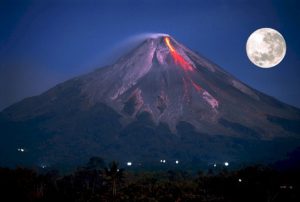How a Volcano Invented Science Fiction & the Bicycle

It Begins...
On April 5th, 1815, Mount Tambora—in present-day Indonesia—began erupting.
The noise made by these eruptions was loud enough to be heard hundreds of miles away. Some English garrisons thought it was cannon fire and sent troops around their islands to investigate.
The eruptions continued until the whole mountain exploded from April 10th and 11th. Mount Tambora's eruption was the single largest in recorded history. So much ash was blasted into the sky that it was pitch black outside as far as four hundred miles away from the mountain.
Tsunamis ravaged the shores of countless islands, and countless more died from ashfall-related complications. (Volcanic ash is really, really nasty stuff, filled with tiny bits of volcanic glass that shred your lungs. Note to file: Don't breathe it in, and don't drink water contaminated with it.)
That was just the start of things, though. By 1816, the Mount Tambora’s airborne ash had spread through the atmosphere to the Northern Hemisphere, kicking off the Year Without a Summer.
A dry fog persisted throughout the spring and summer (what scientists call a “stratospheric sulfate aerosol veil”) that blocked much of the sunlight and kept the temperature from rising to normal levels. Frost began killing off crops in North America, and heavy rain drowned crops in Europe.
Massive famines cased severe social unrest and famine. Hundreds of thousands died in North America, Europe, and Asia. Hungary experienced brown snow, while Italy saw red snow falling throughout the year. The family of Joseph Smith was forced to leave Vermont due to famine, kicking off a chain of events that would lead to the founding of the Mormon Church.
Karl Dranis was inspired by the lack of horses in Germany (no oats to feed them) to invent the velocipede, ancestor of the bicycle.
Mary Shelley, trapped in a Villa with her husband and friends, decided to have a contest to write the scariest story. Her entry, Frankenstein, is commonly considered the original science fiction novel.
I could go on listing consequences for a while. The rapid migration into Indiana and Illinois, leading to their statehoods. Spectacular sunsets. And on and on.
Mount Tambora’s eruption changed the face of the world as we know it. Here's the thing, though: This isn't an anomalous event. It is a singular one, due to its size, but natural disasters and climatic events are major drivers of history, and are far-too seldom treated as such. The current civil war in Syria? One of the primary causes is a drought that led to crop failures.
As much as we like to pretend that we're the bosses of the planet, we need to remember how big our planet is, and how easily it can devastate civilization with a slight shrug.
_________
Quotable
Dear Yard Ramp Guy: I’ve read your quote-off challenge and take it on…only backwards, starting with “Z.” I’ll meet you at “M” in mid-April.